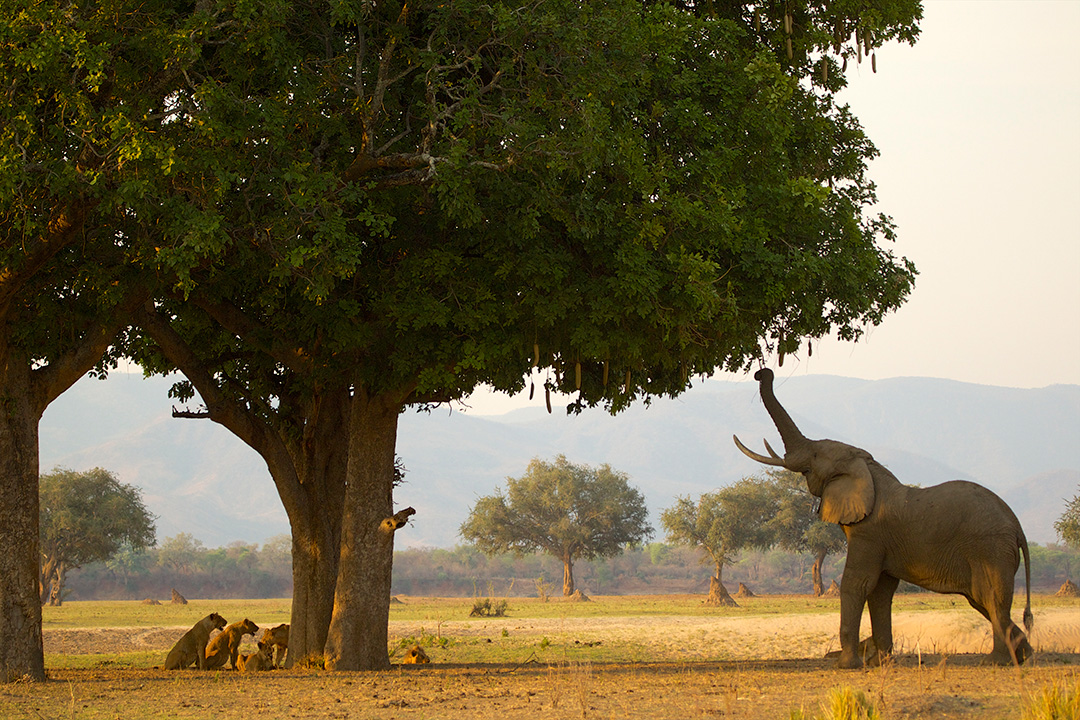An obscure mining company has applied for a licence to prospect for oil and natural gas in one of Zimbabwe’s premier wildlife conservation areas.
The Zimbabwean ministry of mines and mining development published the notice for public comment on 28 April in a government gazette. It details an application by Shalom Mining Corporation Limited for exclusive prospecting rights to an area of about 130 000 hectares along the Zambian border in Hurungwe Safari Park and Mana Pools National Park, south of the Zambezi River.
When questioned about the credentials of Shalom Mining, the permanent secretary of mines and mining development, Pfungwa Kunaka, stated only that it is based in Zimbabwe. But little else is known about the company and an internet search showed no track record, public profile or website.
In the wake of Al Jazeera’s Gold Mafia documentary series, civil society is rightly concerned about deals that lack transparency and are not subject to public scrutiny when the public interest is clearly at stake.
Proximity to the political elite often determines who gets a mining licence in Zimbabwe. In this respect, a company without a public face raises red flags. The window for submitting a formal objection to the application closed on 19 May. Several local safari camps and civil society organisations have done so, citing potential adverse effects on the environment and tourism.
Mana Pools National Park, a Unesco World Heritage site, is known for its exceptional biodiversity. The floodplains and forests are home to large mammal populations, including elephant, buffalo, wild dog, cheetah and spotted hyena, as well as rich migratory birdlife. Plant and forest biodiversity commonly found around flood plains are important sources of carbon sequestration and their protection is one of the most effective ways to combat global warming and climate change. The site has remained largely pristine because of its remoteness. And about 7 000 tourists visit every year, generating millions of dollars in revenue.
But news of Shalom Mining’s application comes in the wake of a recent decision by the Zambian government to give the go-ahead on the development of a large-scale open-cast copper mine in the Lower Zambezi National Park, directly opposite Mana Pools. The Kangaluwi mine site, spanning 1 200 hectares, is situated between two seasonal rivers that discharge directly into the Zambezi River.
President Emmerson Mnangagwa has sought to frame Zimbabwe as “open for business” since coming to power in a 2017 coup ‘d’état and has sought to attract international investors to address the country’s protracted economic crisis. This has included passing legislation designed to relax indigenisation laws and simplify bureaucratic procedures.

In 2021, Zimbabwe’s mining industry contributed about 16% of the country’s GDP and 60% of the country’s foreign currency earnings. In 2020, the government set an annual revenue target of $12 billion for the sector by 2023.
Efforts to boost the sector’s profitability have led to a rush of mining companies in search of oil, gas, and other mineral reserves. While Mutuso Dhliwayo, director of the Zimbabwe Environmental Law Association, asserts that increasing mining exploration in protected areas such as the Mana Pools is in part because many of the country’s most mineral-rich districts have been pegged by multinationals decades ago, thus leaving protected areas for new entrants.
The government previously banned mining in Zimbabwean national parks. It is therefore unclear why Shalom Mining’s permit application is being considered by the ministry. In 2020, the Zimbabwean government gave special grants under the Mines and Minerals Act to two Chinese firms to prospect for coal in the country’s Hwange Game Park. The decision was met by a public outcry and a concerted campaign, which eventually led to a ban on mining in national parks. But there is still no legal clarity on the specifics of the ban. Furthermore, the recently announced concession area falls only partly in Mana Pools National Park.
Regardless of the legality of the application or credibility of the applicant company, oil and gas prospecting in Mana Pools poses significant environmental and economic risks. Just the exploration phase of such a project entails the construction of infrastructure, including roads and drilling platforms, which would fragment animal habitats and disrupt sensitive ecosystems.
To attain World Heritage Status, a country must make an “inventory” of its most important natural and cultural heritage sites located within its boundaries and submit this file for nomination by the Unesco World Heritage Committee. The granting of an exploration permit in Mana Pools would risk losing this status and raises critical questions about the Zimbabwean government’s role as custodian of the country’s natural heritage.
Investing in the oil and gas sector is especially risky at present, given the possibility of stranded assets as fossil fuel divestment gains global momentum and companies such as Shell come under intense scrutiny for reckless operations in places like the Niger Delta in Nigeria. The global transition to clean energy sources may also lead to future financial losses.
The industry is subject to price fluctuations in global markets, making economies heavily invested in them vulnerable to sudden price shocks. Even if the future of oil revenues was guaranteed, governments in fragile or weakly institutionalised contexts tend to become over-reliant on oil rents at the expense of investing in broad-based economic growth. Oil rents also typically enable state repression of dissenting voices or the co-optation of opposition parties. With Zimbabwe’s track record in this domain, there is no good reason to believe that oil rents will be well governed or allocated towards the provision of public goods for Zimbabwe’s already-beleaguered citizens.
Given that Mana Pools is such an important environmental region and already supports sustainable job creation and revenue generation through ecotourism, the potential rewards of prospecting do not seem to outweigh the risks, particularly if this decision opens the door to further exploration in protected areas.








